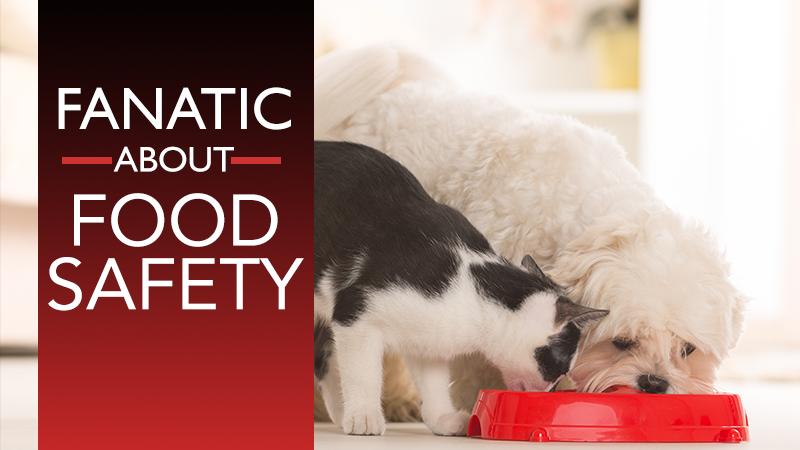Fanatic About Food Safety

We hear about food safety for ourselves on a regular basis. Cook this food to this temperature, throw away that food after a certain period of time and so on. But what about our pet's food? September is National Food Safety Education Month, and Glencoe Veterinary Clinic has several suggestions to keep in mind as you prepare your furry friend's daily meals.
Things to look for in a dry or wet food for your pet include natural preservatives, including Vitamins C and E, or preservative free; human-grade ingredients; and made in the United States. The FDA (Food and Drug Administration) makes sure all ingredients used in pet foods are safe and have an appropriate function in the food. They recommend purchasing products in good condition without signs of damage to the packaging such as dents or tears.
Keep your pet's food and water bowls clean. Pets have bacterial microbes in their mouths just as we do, microbes that can be transferred to food and water dishes. A little food left in the dish makes a good environment for bacteria to grow, potentially causing illness for your pet and any (small) human who may play with the dishes. It's recommended to wash the food bowl between meals each day and the water bowl every other day.
Store your pet's food safely. If you serve a moist food, refrigerate it promptly or throw away any unused, leftover pet food. Leftover dry food and treats should be stored in a cool, dry place -- under 80 degrees -- in its original bag inside a clean, dedicated plastic container with a lid. Always keep the top of the bag folded close and wash and dry the pet food storage container before refilling with new food.
Always wash your hands before and after handling and preparing your pet's food. Though we've always been told to do this for our human food, the same goes with our pets. Bacteria and microorganisms such as salmonella can be spread from us to our pets, especially by accident. Wash your hands with warm, soapy water for 20 seconds before and after handling her food, including treats and feeding dishes.
Avoid feeding your pet a raw food diet. While many believe raw food is good for pets as it allows them to return to their primal roots, these food items can carry harmful bacteria such as salmonella and campylobacter. These bacteria can be transferred between pets and humans alike. Raw diets include meat, poultry, milk and eggs that have not been cooked or treated to remove illness-causing germs.
Food safety goes beyond keeping refrigerated only items cool at all times. And though there are a multitude of pet foods and options on the market, we can help you wade through everything and set up a diet for your pet that meets her dietary needs safely and sufficiently and that your furry friend will find tasty and satisfying. Visit our clinic for a complete line of food options that we offer, including specialty diets. Contact us at 320-864-3414 with any questions about food safety or setting up a personalized diet for your pet.
Image credit: humonia/iStock/Getty Images Plus
Copyright © 2018 by Uhlig LLC. All rights reserved
